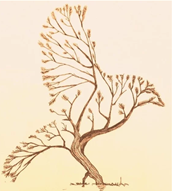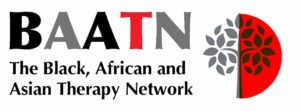Author: Karmela Jones
 Polyamory and non-monogamy have become increasing well-known buzz words in public discourse and, although I neither specialise in therapy specifically related to gender, sexuality and relationship diversity nor do I work with couples, it has been showing up in my therapy room more and more. This has come up with straight clients just about as often as with clients who identify with the LGBTQIA+ community. For me, this has been an exciting if unexpected experience, as my partner and I have been happily non-monogamous for years, but the topic has never been discussed in any of my training, CPD, or interactions with colleagues.
Polyamory and non-monogamy have become increasing well-known buzz words in public discourse and, although I neither specialise in therapy specifically related to gender, sexuality and relationship diversity nor do I work with couples, it has been showing up in my therapy room more and more. This has come up with straight clients just about as often as with clients who identify with the LGBTQIA+ community. For me, this has been an exciting if unexpected experience, as my partner and I have been happily non-monogamous for years, but the topic has never been discussed in any of my training, CPD, or interactions with colleagues.
Considering my own knowledge and personal experience, conversations around polyamory and non-monogamy have been integrated into my client work much as any other topic a client might bring – sometimes as something they want to talk through and explore, sometimes more as contextual information about their lives. Some clients have expressed relief at being able to talk about their unconventional relationships, having feared judgement, scrutiny or even pathology. The fact that they didn’t have to explain every term or concept related to their relationship structure was an unexpected bonus, although they are usually happy to provide more information to help bridge my inevitable gaps in knowledge and experience. Like any kind of difference that doesn’t possess the privilege of being mainstream or ‘normal’, there’s for relief in experiencing familiarity and recognition.
The Shame Factor
I couldn’t help but wonder: what if I had not brought my own openness, knowledge, and experience about relationship diversity into the room? Would they have felt safe to bring it up? What if they had had to explain or even justify their lifestyle choices? Thinking about my personal experiences, my partner and I have been ‘quietly’ non-monogamous because there is the potential of shame, fear and rejection associated with anything that is or has been considered taboo. I don’t want to be judged or excluded and I don’t want the commitment or validity of my relationship to be questioned, which, unfortunately, have been common experiences for me.
If I’m honest, I have carried shame despite being in a loving, committed, and happy open relationship for years. The implication from others that my relationship is somehow less than, that I am ‘greedy’ or that my partner isn’t really committed to me has worked its way into my mind at times and robbed me of the security in what I know is right for me and allows me to live most authentically. They say the clients we need have a way of finding us and in this instance, that has very much been true for me. Clients bringing issues in the context of relationship diversity has caused me to reflection more deeply on my own internal oppressions, what shame I still carry and how that might be impacting not just my work but my own sense of self.
Why Me?
Many colleagues that I’ve spoken to who do not specifically work within the LGBTQIA+ community have told me that the discussion around relationship diversity has never come up in their practice. So why has it come up in my practice, why do these clients keep choosing me? Well, one likely reason is because I am explicit on my marketing and profiles about taking an affirming position on all identities and lifestyles, naming gender, sexuality, and relationship diversity. This is the first step in making a safe place, particularly for those who have had so very few of them, such as our trans siblings. Although I don’t disclose my own relationship style, I do state part of my identity as a bisexual, Black mixed-race woman. Many practitioners have visibly balked when I’ve told them that, but only the first part of that description isn’t fairly clear to anyone who looks at my picture, so I feel the discomfort probably with me identifying my queerness. Many say it’s about non-disclosure or trying to be as neutral as possible, but we don’t live in a neutral world and for a Black mixed-race queer woman, my existence being perceived as ‘neutral’ is not a privilege I have been granted.
Many will also balk at the use of ‘queer’, the capitalisation of Black or the use of ‘mixed-race’, but those are the labels I choose to help define my identity and experiences, and although I could explain or justify them, I don’t have to and I won’t. I believe this is what my clients identify with and why they choose me. They see that I am willing to be honest and unapologetic about the parts of myself that others may wish me to keep quiet and they understand that it’s an invitation for them to say the quiet part loud too. When I have asked my clients why they chose me, every one of those identifying with the global majority and has the lived experience of gender, sexuality and relationship diversity told me it is because I am the only global majority therapist they found available who openly identifies as part of the LGBTQIA+ community and/or makes an unambiguous statement of affirmation. Although white clients don’t usually comment on my race or colour unprompted, the rest is typically the same. Given the fact that I have had a fully occupied full-time practice from the first month I opened up shop, I believe them when they say that obvious, clear safe options were slim.
Am I the only global majority therapist who identifies with and/or takes an affirmative position to gender, sexuality, and relationship diversity? Definitely not, not by long shot, but a quick search tells me not so many are advertising it. Considering we understand how important it is for clients of the global majority to see themselves in our profession, I can’t help but wonder why so many leave this intersection of identity outside the room.
Reflecting On the Greater Implications
Like most therapists, my client work continually asks me to reflect deeper on my own biases, assumptions, education, and experiences. When reflecting on how I came to understand romantic, intimate relationships, I realised that monogamy was the only structure that had ever been normalised for me and that it had strong religious connections. My first memory of becoming aware of different relationship structure was when my mother told me about someone she knew who was in an open marriage, and her opinion was certainly not that this was legitimate or had any other possible outcome beyond failure.
My other exposures were hearing about the ‘backwards and oppressive’ cultures that practiced polygamy, stories ranging from non-Christian savages with strange practices to the patriarchal cruelty of child brides. Other than my mother’s acquaintance, whose marriage was just taking a misguided pitstop on the road to divorce, all these other people were Black and brown, African and Asian, they were Others. So, whilst I reflect on my own experiences of shame and silencing around relationship diversity, I am beginning to ask deeper questions about the role of colonialism, White Supremacy and religious oppression. Like so much else, these issues meet at many intersections and how we view and value different relationship structures is unlikely to be exempt. Again, I am challenged to investigate my own internal oppressor and how I may be challenging or being complicit with my clients’ experiences of marginalisation.
Is it our job as therapists to create spaces with fewer oppressions or more opportunities to explore beyond our oppressions? If so, then we must constantly explore how we may oppress others and ourselves by favouring or defaulting to what might seem normal or acceptable. As any experienced therapist can probably tell you, that experience of confronting privilege and oppression within our practice and indeed within our very beings can be difficult and feel uncertain. But as most will know, it is in difficulty and through uncertainty that we find the most liberating, beautiful moments of acceptance, growth and communion.
Written by Karmela Jones, Integrative Counsellor and Psychotherapist in private practice.
Karmela Jones runs her private practice Mixed Emotions Counselling out of offices in South Kensington and Pimlico. She also offers embodied, experiential CPD opportunities for developing understanding, challenging biases and creating a more inclusive practice around relationship diversity.
